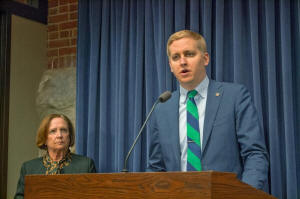House Deputy Minority Leader Demmer considering statewide 2022 run
 Send a link to a friend
Send a link to a friend
[December 19, 2020]
By JERRY NOWICKI
Capitol News Illinois
jnowicki@capitolnewsillinois.com
State Rep. Tom Demmer, of Dixon, is
considering a run for statewide office in 2022. Whether for governor,
U.S. Senate or another position, he has not decided.
The 34-year-old Illinois House Deputy Minority Leader has most recently
been in the news as the leading Republican on the House Special
Investigating Committee of Democratic Speaker Michael Madigan. He’s also
one of the House Republicans’ lead negotiators on the state budget and
Medicaid legislation.
Demmer said in an interview with Capitol News Illinois this week that he
began contemplating a statewide run after discussions with colleagues on
some of the “longer running issues” facing Illinois, including public
corruption and seemingly never-ending budget pressures. Those issues, he
said, have sewn distrust in government that he believes can be remedied
through bipartisan problem solving and coalition building.
“You have to prioritize that idea that we need to restore trust in
government, that we need to turn a page from the ludicrous run of
scandals that have been part of Springfield culture my entire life,”
Demmer said. “And which, every single day, frustrate and make the people
of Illinois become more and more disenchanted that their government is
actually working for them.”

He specifically cited the dual role of Madigan as House speaker for all
but two of the past 37 years and, for two decades, as head of the
state’s Democratic Party. Madigan was named as “Public Official A” this
year in a deferred prosecution agreement in which utility giant
Commonwealth Edison admitted to a bribery scheme aimed at influencing
the speaker.
In the November elections, Republicans successfully deployed Madigan’s
name and image in advertising on a wide scale, pummeling Democratic
candidates for direct or tenuous ties to the speaker. Distrust in state
level politicians was also a theme used to defeat a graduated income tax
constitutional amendment, a key priority of Gov. JB Pritzker.
Madigan has not been charged and denies wrongdoing, but that did not
make the ads any less potent, and the number of high-profile Democrats
and members of Madigan’s caucus seeking his ouster is growing.
Republicans hope the weakening of the speaker brings broader change.
Demmer, who works as director of innovation and strategy at Katherine
Shaw Bethea Hospital which has locations in Lee and Ogle counties, touts
his experiences with making deals in the General Assembly. He also touts
a “common man” upbringing as the son of a public school teacher whose
mother founded the Home of Hope Cancer Wellness Center after his
father’s death from brain cancer.
“I think that Illinois needs representation from average citizens across
Illinois,” he said when asked what lessons could be learned from the
four-year term of Republican ex-Gov. Bruce Rauner. “That we need to have
representatives of the House and Senate and executive branch offices who
really understand what it means to live and work and raise a family in
Illinois.”
He has represented the 90th District since 2013, which includes parts of
Ogle, LaSalle, DeKalb and Lee counties. Prior to that, he was elected at
23 years old to the county board in Lee County, where he resides with
his wife and daughter.

Demmer this week criticized the governor for what he believes is a lack
of bipartisan will, citing quick, partisan approval of a minimum wage
hike in Pritzker’s earliest days in office, as well as a “unilateral”
response to the pandemic.
But some of the bipartisan proposals Demmer promotes as his own wins
became law with Pritzker’s signature.
Among them were a series of jobs-focused measures which were included in
a budget and capital infrastructure package which came together in the
eleventh hour of Pritzker’s first year as governor in 2019.
Those include the Blue Collar Jobs Act, which offsets some portion of
labor costs of large-scale industrial projects, a phased-in repeal of
the state’s franchise tax and added incentives for bringing data centers
to Illinois. That helped spur Facebook’s announcement this year of an
$800 million data storage facility planned for DeKalb.
Still, while Pritzker and Republican and Democratic leaders alike
praised the 2019 budget and Rebuild Illinois capital infrastructure plan
after their bipartisan passage, Demmer said this week he believes
bipartisanship is the “exception to the rule” when it comes to the
governor. That’s despite the fact Pritzker had supportive
supermajorities in each chamber in his first year, meaning legislation
could be passed without Republican support.
He pointed to Pritzker’s pandemic response, which has included limited
legislative action from lawmakers in Springfield. The governor has said,
however, that he would prefer if lawmakers did meet and take further
action on pandemic-related measures.
Lawmakers met briefly in May to pass mail-in voting expansion and other
limited-scope pandemic-related measures, as well as a budget which
included a $3.9 billion deficit which moved forward on partisan lines.
Other than that, Democratic leaders have canceled session, citing health
concerns, and Pritzker has not used his authority to call a special
session.
[to top of second column]
|

Rep. Tom Demmer, R-Dixon, is pictured at the Illinois Statehouse in
a May 2019 news conference. Also pictured is Rep. Norine Hammond,
R-Macomb. Demmer told Capitol News Illinois he is considering a
statewide run for office in 2022. (Capitol News Illinois file photo
by Jerry Nowicki)

Demmer said the lack of involvement of legislators in response to
the pandemic adds another layer of distrust to state government.
While Pritzker frequently cites ongoing discussion with Republicans,
Demmer said the role of the General Assembly is to meet
deliberatively, not to serve as “consultants” in private calls to
the governor.
“The result of that is that many people around the state of Illinois
feel like their voice hasn't been heard,” he said. “They feel like
their community hasn't been taken into consideration. And it's
harmed the ability for local officials to implement and enforce
these executive orders. And it's also harmed the general public's
ability to trust, and comply with those decisions.”
Pritzker – who this week announced more than $700 million in budget
cuts to address the anticipated $3.9 billion deficit in the budget
he signed – has criticized Republicans for opposing his budget
proposals without offering alternatives.
Demmer and fellow Republicans in May opposed the governor’s budget,
saying it was based on “hypothetical revenues” created by the
graduated income tax, which failed, and a federal stimulus package
for states that has stalled in Congress. But when asked if
Republicans should propose a list of budget cuts going into
negotiations, Demmer said that’s not his preferred way of
negotiating.
The state should first adopt a realistic revenue estimate and host
appropriations hearings throughout the session to plan on spending
the anticipated revenue, he said, instead of adopting a revenue
estimate to accommodate spending at the end of a legislative
session. It’s customary in Springfield that budgets are negotiated
by nonpublic working groups then brought to rank-and-file lawmakers
in the waning hours of session with limited time for review.
Demmer and Pritzker have also agreed that Madigan should have
testified before the legislative committee launched by Republicans
to investigate his ComEd ties. Democrats dissolved the committee
this week, asserting that it was called for political purposes.

Asked if his intent to run for statewide office gives credence to
the claim that the committee was called to advance Republican
members’ visibility, Demmer pointed to the seriousness of the
allegations.
“Given the facts that are laid out in federal court, I would be
shocked if that happened in any state if there wasn't an
investigation into the only public official who's identified in the
court filings and one who was at the very center of an incredibly
comprehensive scheme that was admitted to by a public utility,” he
said.
For a statewide run, Demmer would have the support of House
Minority Leader Jim Durkin, of Western Springs.
“Tom, I think, fits the profile of what the Republican Party needs
to put forward in this next election cycle,” Durkin said in a phone
call this week, praising Demmer’s budget skills and ability to
distill the complicated document into “common language.”
Durkin also touched on divisions within the Republican Party –
often visible within the House Republican caucus – and what he
believes is Demmer’s ability to bridge them.
“Tom believes in Republican principles, but he's also a person who
believes that we can resolve differences that we have to improve the
state,” he said. “So that's what a great majority of people are
looking for – people want results. They want leaders that are going
to be collaborative. They're looking for leaders to get things
done.”
Jeffrey Brincat – a political donor who supported Rauner’s two
campaigns, was appointed by the former governor to the Illinois
Racing Board and served as finance chair on the campaigns of former
U.S. Sen. Mark Kirk and former U.S. Rep. Bob Dold, both Republicans
– said in a phone call this week he will also back Demmer.
Brincat has also donated to former Democratic House member Scott
Drury and current Rep. Stephanie Kifowit, D-Oswego – a pair of
lawmakers who have publicly feuded with Madigan.
“There's a very commonsense, good judgment perspective a guy like
Tom brings to Illinois politics,” Brincat said. “And I would argue
that maybe that's the sea change shift we need to make a government
stop working for the powerful and well connected and make it work
for Illinois again.”
The filing period for petitions to run in the March 2022 primaries
is expected to be Nov. 22-29 of 2021, according to a spokesperson
for the Illinois State Board of Elections. Established party
candidates can begin passing petitions 90 days before the last day
of filing, which would be Aug. 31, 2021.
Capitol News Illinois is a nonprofit, nonpartisan
news service covering state government and distributed to more than
400 newspapers statewide. It is funded primarily by the Illinois
Press Foundation and the Robert R. McCormick Foundation. |